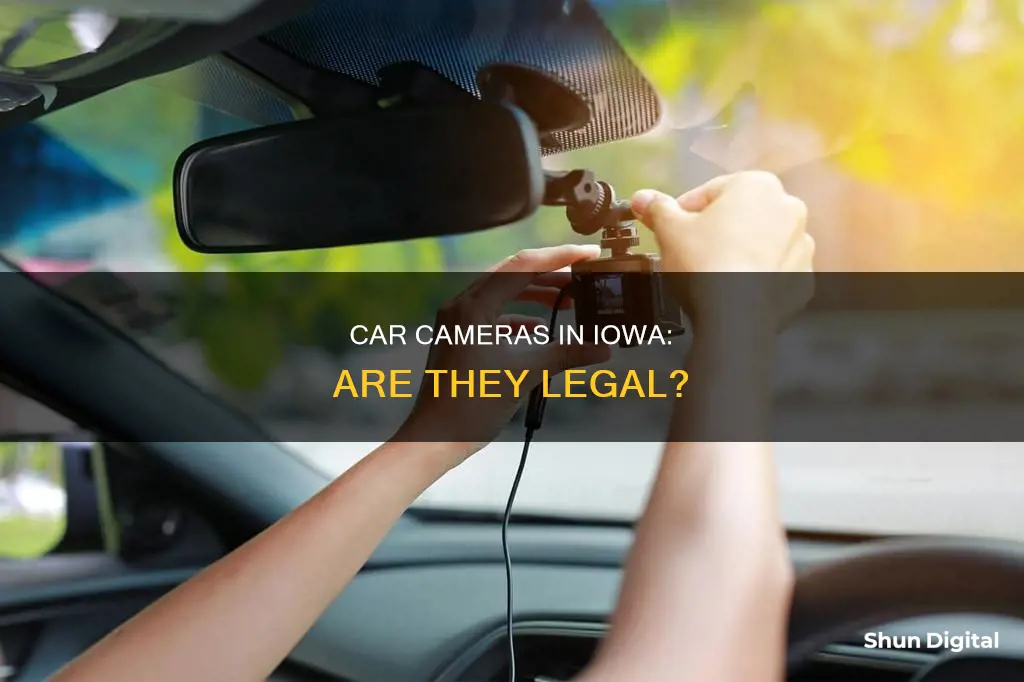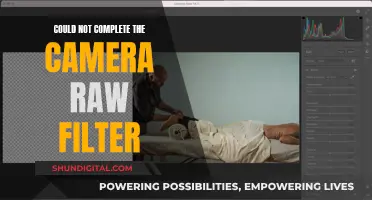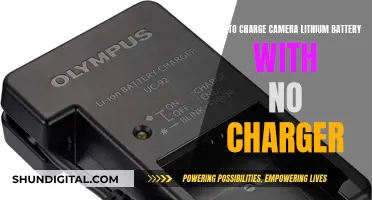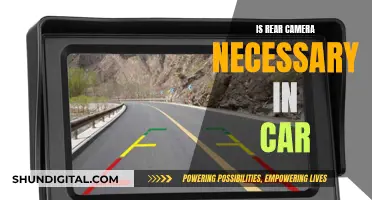
The use of car cameras in Iowa has been a controversial topic, with some arguing that they are necessary for improving road safety and others claiming that they are an invasion of privacy and a way for local governments to generate revenue. In 2019, the Iowa Supreme Court ruled that speed cameras on highways, interstates, and city roads were legal and did not violate a driver's due process rights. However, there have been ongoing debates and efforts to regulate or ban their use. As of 2024, new laws have been implemented that place limits on how and when cities and counties can use these devices to issue tickets, with standardized fines in place for speeding violations.
| Characteristics | Values |
|---|---|
| Are car cameras legal in Iowa? | Yes |
| Who approved the use of car cameras? | Iowa Supreme Court |
| What type of cameras are used? | Speed cameras, red light cameras |
| Where are the cameras located? | Highways, interstates, city roads, intersections |
| Which cities in Iowa use car cameras? | Des Moines, Cedar Rapids, Davenport, LeClaire, Muscatine, Fort Dodge, Polk County, Sioux City, Windsor Heights, Clive, Council Bluffs |
| What are the fines for speeding violations? | $75 for 11-20 mph above the limit, $100 for 21-25 mph, $250 for 26-30 mph, $500 for >30 mph |
| What are the fines for red light violations? | $100 for automated camera violations, $195 for officer-issued citations |
| What are the regulations for using car cameras? | Cities and counties must obtain permits, provide written justification, submit annual reports, place warning signs, etc. |
What You'll Learn

Iowa's speed cameras legality
Speed cameras are legal in Iowa, as affirmed by the Iowa Supreme Court in 2019. The Court ruled that speed cameras along highways, interstates, and city roads do not violate a driver's due process rights. The decision highlighted the small fines associated with these violations and the absence of physical force or infringement on fundamental travel rights.
However, the legality of speed cameras in Iowa has been a subject of ongoing debate, with some lawmakers seeking a complete ban on their use. In 2024, the Iowa Senate approved regulations for traffic cameras that automatically issue speeding tickets, marking a significant development in the state's efforts to regulate these devices.
The approved regulations require cities to obtain permission from the Iowa Department of Transportation (DOT) before installing speed camera systems that issue tickets. The DOT assesses the appropriateness, necessity, and potential impact on traffic safety at the proposed locations. This regulatory framework aims to hold cities accountable and ensure that speed cameras are deployed only where justified.
Under the new rules, several restrictions and requirements have been put in place. For instance, tickets can only be issued if a driver is travelling more than 10 miles per hour over the speed limit. Additionally, communities with a population of 20,000 or fewer are prohibited from issuing tickets through their camera systems, although they can still issue warnings.
Local governments must also provide advanced signage, notifying drivers of the presence of speed cameras, and any data collected by automatic license plate readers must be deleted within 30 days unless it is part of an ongoing criminal investigation. Furthermore, cities are mandated to submit annual reports detailing collision statistics and the number of citations issued at locations with traffic cameras.
The regulations also standardize the fines for speeding violations captured by traffic cameras, with fines ranging from $75 to $500 based on the excess speed over the limit. These regulations aim to strike a balance between public safety and the protection of drivers' rights in Iowa.
The Demise of Kodak's Disposable Cameras
You may want to see also

Red light cameras in Council Bluffs
In Iowa, speed cameras are legal. In 2019, the Iowa Supreme Court ruled that speed cameras do not violate a driver's due process rights. These cameras are placed along highways, interstates, and city roads.
The City of Council Bluffs in Iowa utilizes automated camera technology for the detection of red-light violations. This technology aids the Police Department in monitoring several intersections with a limited number of officers, contributing to safer streets. The locations of these cameras are clearly marked with signage before the intersection. When a vehicle enters the intersection against a red light, a still photograph and video are captured. After a police officer verifies and approves the violation, a citation is sent to the registered owner of the vehicle. This citation is classified as a municipal infraction and is not reported to the State of Iowa or any Department of Transportation. It also does not become a part of the vehicle owner's driving record. The fine for this violation is set at $100.
The website www.violationinfo.com allows individuals to review the video footage of their violation by entering the Notice # and PIN provided on the citation. If the registered owner chooses to dispute the violation, they can submit an "Administrative Review Request Form" found at the bottom of the citation. Once an Administrative Review date is scheduled, they will be notified by mail. Payments for violations can be made by phone, mail, in person at the Council Bluffs City Treasurer's Office, or online.
It is worth noting that citations issued by an officer for a red-light violation carry a higher fine of $195 and become a part of the driver's record.
The red light detection cameras in Council Bluffs are currently located at several intersections along West Broadway, Kanesville Boulevard, South 7th Street, South Expressway, and other streets.
Movie Camera Anatomy: Unveiling the Intricate Components
You may want to see also

Traffic cameras' safety and revenue
Traffic cameras are legal in Iowa, and while many citizens support their use, there is a growing movement to ban them. The controversy surrounding traffic cameras centres on two key issues: safety and revenue.
Safety
Traffic cameras are often promoted as a way to improve road safety and reduce accidents. Research has shown that they can be effective in this regard, with studies indicating that traffic cameras can lead to a significant reduction in red-light violations and accidents. For example, a study by the Insurance Institute for Highway Safety found that traffic cameras reduced red-light violations by 40% and fatal accidents by 24% in cities where they were installed.
However, there is conflicting safety data, and some argue that traffic cameras can actually increase rear-end accidents as drivers suddenly brake to avoid a ticket. Additionally, there are concerns that traffic cameras are less effective at stopping dangerous drivers, such as those who are drunk or repeat high-speed offenders, when compared to traditional police enforcement.
Revenue
One of the main criticisms of traffic cameras is that they are more about generating revenue for local governments than improving safety. Traffic cameras can bring in millions of dollars in fines each year, and there is little indication that this revenue is being used to promote public safety. In Iowa, for example, cities like Cedar Rapids and Des Moines have collected millions of dollars from traffic camera fines, with the money going into general funds or being spent on things like police staffing and public safety radio systems.
The revenue generated from traffic cameras has led to concerns about unfair ticketing practices and the reliance of localities on this income. There are also concerns about the lack of transparency and accountability with private companies that operate the cameras, as they are not subject to the same open record laws as local governments.
In conclusion, while traffic cameras have the potential to improve road safety, particularly at intersections, the controversy surrounding their use in Iowa highlights the need for clear guidelines and regulations to ensure their effectiveness and fairness in promoting safety rather than revenue.
Note 5 Camera: Features Beyond Standard Modes
You may want to see also

Iowa's new traffic camera regulations
As of July 1, 2024, Iowa has implemented new regulations for automated traffic enforcement cameras. These regulations aim to standardize the use of these controversial devices and address concerns over unfair ticketing practices and revenue generation.
Permit Requirements:
Cities and counties seeking to install traffic enforcement cameras must first obtain a permit from the Iowa Department of Transportation. They need to provide a written justification, including records of traffic violations, collision severity, speed data, and alternative methods considered to improve public safety.
Ticketing and Fine Standardization:
The new law, House File 2681, specifies that traffic cameras can only issue tickets when a driver exceeds the speed limit by more than 10 miles per hour. Fines have been standardized across the state, ranging from $75 for driving 11-20 mph over the limit to $500 for exceeding the limit by more than 30 mph. Speeding in a work zone will result in double the standard fine.
Community Size and Signage:
Communities with a population of 20,000 or fewer are prohibited from issuing tickets through their cameras but can still issue warnings. Local governments must also place signs at a distance of 500 to 1,000 feet before any traffic cameras to notify drivers of their presence.
Driver Identification and Data Retention:
Drivers who receive a ticket have the option to provide evidence that they were not behind the wheel at the time of the violation. They must submit the name and address of the person driving the vehicle. Any photos of license plates captured by the cameras must be deleted within 30 days unless they are part of an ongoing criminal investigation.
Annual Reporting and Collision Data:
Communities with traffic cameras are required to submit annual reports to the Department of Transportation by March 1. These reports must detail the number of collisions and citations issued at locations with traffic cameras. This data will provide insights into the effectiveness of these cameras in improving road safety.
The new regulations aim to balance the use of traffic cameras for public safety while addressing concerns over unfair ticketing and revenue generation. By standardizing practices and increasing transparency, Iowa aims to create a more consistent and equitable system for motorists while still utilizing technology to enforce traffic laws.
Bullet Surveillance Cameras: What Are They and Why Use Them?
You may want to see also

Disputing a speeding ticket
In Iowa, speed cameras are legal. In 2019, the Iowa Supreme Court ruled that speed cameras on highways, interstates, and city roads do not violate a driver's due process rights. The use of these cameras has been a topic of debate, with some arguing for a ban and others pushing for regulations.
Now, onto the topic of disputing a speeding ticket. While the best way to avoid a speeding ticket is to adhere to the speed limit, there are times when you may feel that you've been unfairly fined. Here are some things to consider if you're thinking of disputing a speeding ticket:
Understanding the Evidence
In most cases, speed cameras and police officers collect compelling evidence, making it challenging to dispute the charge. However, there may be rare instances where the equipment is faulty or incorrectly calibrated, leading to an inaccurate reading. If you're confident that you were driving within the speed limit and believe the fine was unjust, you may have grounds for an appeal.
Common Grounds for Disputing a Speeding Ticket:
- Inaccurate speed cameras: You can dispute the accuracy of average speed cameras if you have valid reasons to believe they are incorrect.
- Missing or incorrect speed limit signs: If there were no visible speed limit signs where the alleged offense took place, or if the signs were incorrect or inconsistent with the posted traffic signs, you may have grounds for an appeal.
- Issues with the Notice of Intended Prosecution (NIP): The NIP must be sent within 14 days of the alleged offense and may include incorrect information, such as an invalid charge or errors in the nature, time, or location of the offense.
- Exceptional circumstances: If there were extenuating circumstances that affected your ability to drive within the speed limit, such as being blinded by sunlight or dealing with personal issues, you may be able to dispute the ticket.
- Fine severity: If you believe that the fine does not reflect the severity of the offense and seems disproportionately high, you may want to calculate the fine using a speeding fine calculator to verify if it is indeed unjust.
- Incorrect recipient: In rare cases, a speeding ticket may be issued to the wrong person or vehicle. For example, it could be meant for a vehicle using a cloned number plate matching yours.
Steps to Dispute a Speeding Ticket:
- Respond to the speeding ticket: Indicate that you do not plead guilty to the alleged offense. This will result in a court summons being sent to your address.
- Seek legal advice: Consider contacting a solicitor or speeding offense specialist. Representing yourself can be risky, as it requires specialized knowledge and a thorough understanding of the law.
- Gather evidence: Collect any information or evidence that supports your case and disproves the validity of the speeding ticket. This could include GPS data, witness statements, or proof that you were elsewhere at the time of the alleged offense.
- Attend your court date: Present your case and any supporting evidence before a magistrate. Be respectful and well-prepared, as magistrates can be sympathetic to a well-argued and thoughtfully presented case.
- Verdict: You will receive a verdict on your appeal, which is typically final. If your appeal is successful, your speeding ticket will be overturned. However, it's important to remember that successful appeals are relatively rare.
Remember, disputing a speeding ticket is not always straightforward, and there are potential risks and costs associated with the process. Carefully consider your grounds for disputing the ticket and seek appropriate legal advice before proceeding.
Mounting a Battery Plate: A Guide for Cameramen
You may want to see also
Frequently asked questions
Yes, car cameras are legal in Iowa. The Iowa Supreme Court ruled in 2019 that speed cameras do not violate a driver's due process rights.
Iowa uses red light cameras and speed cameras.
Car cameras are located in several communities across Iowa, including Cedar Rapids, Clive, Council Bluffs, Davenport, Des Moines, Fort Dodge, Muscatine, Polk County, Sioux City, and Windsor Heights.
As of July 1, 2024, new regulations for automated traffic enforcement cameras were implemented in Iowa. Cities and counties must obtain a permit from the Iowa Department of Transportation and provide a written justification for the cameras. Traffic cameras can only issue tickets when a driver exceeds the speed limit by more than 10 miles per hour, and communities with a population of 20,000 or less can only issue warnings. Signs must be placed in advance of any traffic cameras, and photos of license plates must be deleted within 30 days unless they are part of a criminal investigation.







